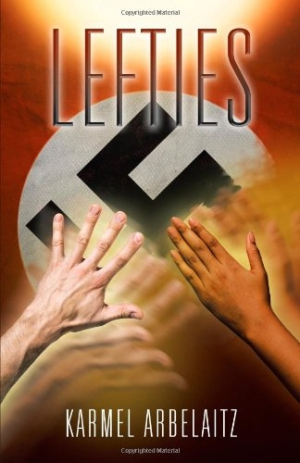Lefties
Grandmothers are supposed to wield rolling pins and trays of cookies, not pistols, knives, and nooses. Yet the grandmother in Lefties, by Karmel Arbelaitz, is on a mission: Rid the world of men with no morals, especially those who abuse or mistreat women.
When the narrator is informed of his estranged grandmother’s death and given a basket of her personal belongings, he is eager to learn about his heritage. His expectations turn to horror, however, as he finds that her diary is not full of childhood memories, but confessions to seven brutal murders committed during World War II. After reading the diary and matching the confessions to newspaper clippings, the narrator is unsure of what to do with the information he possesses.
Although the reader never learns her name, the left-handed grandmother details the seven murders that earned her the nickname, “The Leftist Killer.” “Women have suffered in a monumentally loud silence throughout the ages, and that contemptible silence has been bursting in my ears,” she writes, explaining her reasons for taking action. However, her diary entries are silent on her emotional reactions to taking a life in a violent manner, leaving her grandson with unanswerred questions about how she justified becoming a murderer.
Such questions drive the novel, pushing the narrator through an intense psychological examination of a grandparent he never met. His deductions are flawed, however, since he assumes the best about her, not the worst. For example, nothing in the diary suggests that she was seeking forgiveness; perhaps she simply wanted the world to give her credit for her efforts. Still, the reader is left with the impression that the grandmother acted in good faith, even if her deeds were ethically wrong—the dilemma at the heart of the story.
Lefties is a gory tale. Fully one-third of this novella outlines how the Leftist Killer stalked, planned, and executed the people she deemed unfit for society. Each of the murders is guided by a predictable formula: The grandmother lists a man’s crimes and issues his death sentence; she learns the habits of her target by stalking him; she selects a murder weapon; and she commits the gruesome execution. Fewer details would have sufficed, as would have excerpts from the diary instead of entire pages.
A slow but deeply philosophical book that ponders the nature of crime, this novella sometimes reads like a history lesson in feminism as the narrator tries to share his sincere and profound revelations about the atrocities committed against defenseless women. Frequent punctuation errors slow down the plot, as does the narrator’s heavy use of stream-of-conscious questioning about his grandmother’s motives and personality. Even so, the author makes valid, powerful points about moral obligations and what happens when they are overlooked; unfortunately, his points are pondered to the edge of boredom.
History professors, World War II buffs, feminists, and those who are looking to engage in ethical debates may enjoy reading Lefties.
Reviewed by
Emily Asad
Disclosure: This article is not an endorsement, but a review. The publisher of this book provided free copies of the book and paid a small fee to have their book reviewed by a professional reviewer. Foreword Reviews and Clarion Reviews make no guarantee that the publisher will receive a positive review. Foreword Magazine, Inc. is disclosing this in accordance with the Federal Trade Commission’s 16 CFR, Part 255.

